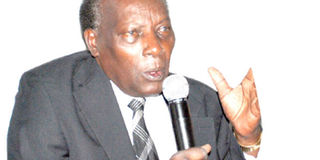The chief support of democracy is an educated, courageous people

In the previous contribution, I discussed the virtues and vices of Uganda’s current education system.
Without good education, people live in ignorance. The consequences of ignorance are fear of the unknown. The fear is the root of unreachable subservience. Ignorance dampens courage.
Lack of courage allows autocracy to thrive in society.
Autocracy is sustained by a submissive standing army and a corrupt police force. Democracy and freedoms are sustained by an educated population.
Indeed, there is a saying that: “The most costly thing in the world is ignorance.” We also know that education is expensive but there is another saying that: “If you think education is expensive, try ignorance.”
It is much easier to frighten the uneducated and profit from them than persuade the educated to agree to what they know to be wrong.
As Frank Den wisely remarked, “Get all the fools on your side and you can be elected to anything.” The uneducated will have not read George Orwell to know that freedom is the right to tell people what they do not want to hear or Adalai Stevenson who said, “A free society is a place where it is safe to be unpopular,” or the icon of Africa’s struggles for freedom, Nelson Mandela, who said, “I have cherished the idea of democratic and free society in which all persons live together in harmony and with equal opportunities. It is an ideal which I hope to live for and achieve. But if need be, it is an ideal for which I am prepared to die.”
It goes without saying that education which does not inspire and force action is not education. I have previously commended President Museveni and his comrades and supporters who fought against the shackles of authoritarianism and chaos in the 1980s.
Later, Africa welcomed his statement which he made in his address to the African Union just shortly after the NRM seized power from the short-lived administration of Gen Tito Okello Lutwa in 1986.
Museveni said, “The problem of Africa in general, and Uganda in particular, is not the people but leaders who want to overstay in power.”
To be wanted or not, is easily discovered through several factors and observations beyond the mere count of votes cast in periodic elections which are often affected by electoral malpractices.
President Museveni is also on record as having stated publicly that “the modernisation of Uganda can only be activated by an educated population”.
To be educated is not what it literally sounds.
As I showed in previous articles in this column, it takes more than the number of classes or academic qualifications for one to claim to have either been educated or being knowledgeable in anything.
A good medical illustration will suffice. Recently, a well-known professor of psychiatry was invited to examine and assess a patient’s mental and intellectual ability.
For an hour or so, the psychiatrist and two senior doctors interviewed the patient on all aspects of his life since birth and the psychiatrist was able to assess and report that the patient was in perfect good health and mental condition.
Later, the same patient was tested by a relatively young doctor and a student of psychiatry who came up with startling results claiming the same patient was suffering from a feeble mind, loss of memory and dementia!
This scenario shows that there are people of the same profession who may have gone to higher centres of learning and obtained paper passable qualifications and seemingly the same degrees but who are not educated or knowledgeable, in the same discipline.
In any event, a country may have an educated class of citizens, but if those citizens are, for one reason or another, inhibited or frightened to stand up and fight for their rights and those of others, the country will still suffer from inertia, ignorance, misrule and underdevelopment in the same way as political primitive communities which do not know that when they are misgoverned.
A significant number of Ugandans are not only educated but are courageous. Otherwise, there would be no challenges to electoral malpractices or other offences committed by diverse culprits including members of the ruling classes.
There would be no challenges to the President’s statement that he is not a servant of people when only recently he begged votes from them.
The newspapers’ editorials and comments which appeared in the print and social media are clear evidence that Uganda has a sufficiently educated manpower which should be harnessed and guided to do much better.
Prof Kanyeihamba is a retired Supreme Court judge.




